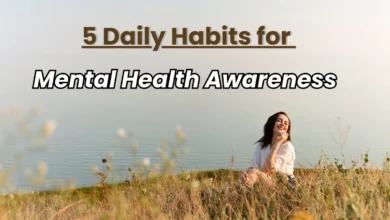Hidden Signs You’re Stressed and Don’t Know It

Introduction: Are You Really Fine—or Just Functioning?
The hidden signs you’re stressed don’t always show up as panic attacks or obvious breakdowns. Sometimes, stress wears a disguise. It blends into your day-to-day life—masked as fatigue, forgetfulness, or even irritability. The problem? You think it’s just “one of those days,” but in reality, your mind and body are waving subtle distress signals.
These are the hidden signs you’re stressed that you might not recognize—until they start to interfere with your life in subtle yet powerful ways.
What Is Hidden Stress and Why You Miss It
Hidden stress is like a slow leak. You don’t notice it right away, but over time, it drains your energy, motivation, and joy. Unlike acute stress, which specific events often trigger, hidden stress is usually chronic, creeping in gradually as you juggle responsibilities, emotions, and unspoken expectations.
“Your body whispers before it screams.”
Many people are walking around with stress-related symptoms they chalk up to bad habits, low energy, or simply being “lazy.” But underneath it all lies unacknowledged emotional and mental pressure.
Causes of Hidden Stress
You don’t need to go through a major crisis to feel the effects of stress. Often, the most common life situations are the biggest contributors:
- Constant multitasking without proper rest
- Digital overload (hello, 47 open tabs and nonstop notifications)
- People-pleasing and emotional suppression
- Lack of boundaries in work or relationships
- Unprocessed emotions from past events
- Sleep deprivation masked by caffeine
Over time, these become chronic stress triggers—especially when we normalize them.
10 Hidden Signs You’re Stressed and Don’t Know It
Let’s dig into the subtle, often-overlooked clues your body and mind may be giving you.
1. Waking Up Exhausted: A Subtle Symptom of Chronic Stress
If your body is technically resting but your mind is still running marathons all night, you’ll wake up feeling more exhausted than when you went to bed. This type of fatigue isn’t fixed by an extra hour of sleep. It’s mental exhaustion, and it often flies under the radar.
Stress keeps your brain in a mild fight-or-flight mode and blocks it from reaching the deep, restorative sleep your body depends on. Over time, this leads to a constant state of grogginess—even when you think you’re “resting enough.”
2. Trouble Focusing: A Subtle Sign of Stress
Have you found yourself re-reading the same paragraph multiple times or forgetting what you went into a room for? That’s not random forgetfulness—it could be a hidden sign you’re stressed, especially when your brain feels overloaded and unfocused.
Stress impacts the prefrontal cortex, the part of the brain responsible for focus, decision-making, and memory. When your brain is overloaded, even simple tasks feel mentally taxing. People often mistake this for distraction or clumsiness, when in reality, your brain is simply asking for relief.
3. Overwhelmed Easily? A Hidden Sign You’re Stressed
Folding laundry, replying to a text, or even brushing your hair can feel like monumental tasks when your stress levels are high—even if your day wasn’t “that busy.”
This isn’t laziness. It’s a classic shutdown response, often linked to emotional exhaustion. Your mind perceives everything as “too much” because it’s already been carrying silent mental pressure—sometimes for days, sometimes for weeks.
“When you’re overwhelmed by small things, it’s not the task—it’s the weight you’re already carrying.”
4. Irritability: An Early Symptom of Mental Fatigue
You used to laugh off the little things. Now? One wrong look, a loud noise, or a slight inconvenience feels like a personal attack. If you’re snapping more often or constantly feel “on edge,” it could be stress.
Chronic stress reduces your emotional bandwidth. It puts you in a heightened state of alert, so even minor frustrations trigger outsized reactions. You may not feel anxious on the surface, but your nervous system is in constant defense mode—a subtle stress symptom many people overlook.
5. Social Withdrawal: An Overlooked Sign of Emotional Exhaustion
Are you ignoring messages, skipping plans, or feeling drained by conversations? That’s not just introversion. It could be emotional fatigue.
When you’re stressed, even small talk can feel exhausting. The energy it takes to be “socially available” feels like too much. If you’re withdrawing from people you normally enjoy, it might be a sign that your mind is trying to conserve what little emotional energy it has left.
6. Stress Symptoms Often Show Up in Your Appetite
Stress also interferes with appetite regulation. Some people lose their desire to eat completely. Others crave comfort foods—especially carbs and sugar—to soothe emotional tension. These hidden signs of stress often show up in behavior before we recognize them mentally.
Pay attention to the “why” behind your eating patterns. If you’re eating not out of hunger but to cope, or skipping meals without realizing it, stress may be silently guiding your behavior.
7. Emotional Numbness: A Hidden Sign You’re Stressed
You used to get excited about little things. Now? Everything feels flat. Joy, sadness, even anger seem distant or dull. This emotional numbness is a common sign of hidden stress.
Ultimately, when your brain feels overwhelmed, it tries to protect you by suppressing emotions instead of processing them. You’re not becoming cold or disconnected—ongoing, unrecognized stress is emotionally draining you day by day.
8. Overthinking Everything: A Sign of Emotional Exhaustion
Replaying conversations. Worrying you said the wrong thing. Imagining worst-case scenarios that never happen. This isn’t “just how you are.” Chronic stress often fuels anxiety, making it harder to identify what’s really bothering you.
Constant pressure forces your mind into hyper-analysis mode, where it keeps looping over thoughts and outcomes. As a result, you try to control outcomes to prevent more stress, but your brain spins deeper into cycles of self-doubt and fear.
“Overthinking is the thief of peace.”
9. Stress Lives in the Body: Watch for Physical Clues
Stress doesn’t just live in your mind—it shows up in your body. You might notice:
- Tension headaches
- Tight shoulders or neck
- Jaw clenching
- Unexplained fatigue
- Skin breakouts or sensitivity
- Digestive discomfort
Even if you eat well and exercise, stress can inflame your body and trigger physical symptoms that don’t seem to have a medical explanation.
10. Uneasy in Silence? A Hidden Sign You’re Stressed
If you feel an urge to fill every moment with noise—TV, music, podcasts, scrolling—ask yourself why silence feels uncomfortable.
Many people use distractions to avoid facing their thoughts. In fact, if the idea of sitting quietly feels unsettling, it’s likely that unprocessed tension and emotions are overwhelming your inner world. Silence doesn’t create stress—it simply reveals what’s already there.
Conclusion: Recognize the Subtle Signs of Stress Early
The loudest part of stress isn’t always panic or breakdowns—it’s the quiet withdrawal, the emotional distance, the constant feeling of being off without knowing why.
When you recognize the hidden signs you’re stressed, you take a crucial step toward self-awareness and healing. The body never lies. And if you ignore the whispers long enough, they will eventually turn into shouts—through burnout, illness, or breakdown
You don’t need a dramatic moment to take action. Sometimes, noticing is enough to begin. The next time you feel “off,” don’t just brush it aside. Listen. Reflect. After all, your mind and body are always speaking—you just have to decide when you’re ready to hear them.










Thank you for your sharing. I am worried that I lack creative ideas. It is your article that makes me full of hope. Thank you. But, I have a question, can you help me?
Your article helped me a lot, is there any more related content? Thanks!
Can you be more specific about the content of your article? After reading it, I still have some doubts. Hope you can help me.
Need a quick 188Bet link? 188betlinkvao.net is pretty decent. Got in without any problems. If you need a fast lane, give it a go! 188betlinkvao!
Your article helped me a lot, is there any more related content? Thanks!
Thanks for sharing. I read many of your blog posts, cool, your blog is very good.
Your article helped me a lot, is there any more related content? Thanks! https://www.binance.info/sl/register?ref=I3OM7SCZ